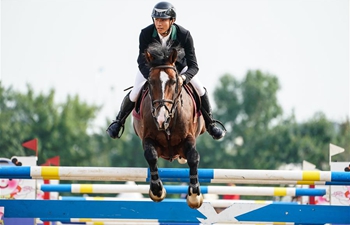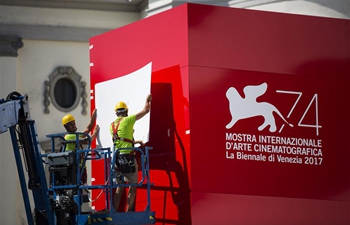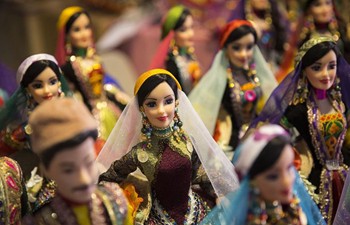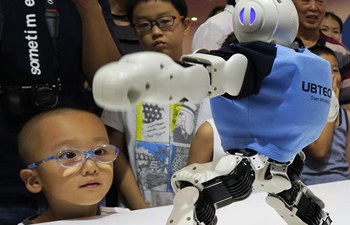NAIROBI, Aug. 29 (Xinhua) -- Kenyan President Uhuru Kenyatta on Tuesday urged Supreme Court to strike out an election petition filed by his main challenger Raila Odinga over lack of credible evidence.
Kenyatta's lawyers told the judges sitting in Nairobi that Odinga's petition is founded on hearsay and allegations, which the opposition leader has failed to prove.
"Even if the lowest standard of proof is applied, this petition will be dismissed," Kenyatta's lawyer Ahmednasir Abdulahi said as he started Kenyatta's reply to the petitioner's submission.
Abdullahi argued that a presidential election can only be invalidated by reverse engineering Article 38 (2) which states "every citizen has the right to free, fair and regular elections based on universal suffrage and the free expression of the will of the electors for any elective public body or office established under this Constitution, or any office."
Abdullahi said that from his understanding of the law: "In 99 percent of the cases, you can only invalidate a presidential election on the transgressions of the voter. Maybe one percent if it is the electoral body (IEBC). It's all about the voter. I will show this court why I consider that petition a piece of science fiction."
"Its only when you can show that a voter entitled to vote was denied the right to practice his/her political right that the court can nullify a presidential election," he argued.
In the petition, Odinga wants the Supreme Court to nullify the poll results on the grounds that the IEBC favored his rival Kenyatta during the elections.
Odinga also said in the court papers that his votes were systematically reduced in some instances and added to Kenyatta's count and that the errors recorded in the entire process were too gross to an extent that it is nearly impossible to ascertain whether Kenyatta actually won the elections.
Odinga further claimed that the results were transmitted from strange areas, which were not gazetted and by ungazetted officials.
However, Kenyatta through his lawyers said the case by Odinga can only excite directors of Hollywood. "The petition by Odinga is like a science fiction that can only excite movie directors at Hollywood."
Abdullahi told the judges that for the petition to succeed, the court would have to find that the 15 million Kenyans who voted on Aug. 8 do not count.
"This petition pleads no cause of action. Even if you lower the standard of proof to one below balance of probability, this petition will still be dismissed," he said.
The overwhelming majority of seats the governing party secured in the election, President Kenyatta's lawyers argued, was proof of his popularity.
"If he secured a paltry 10 seats in Parliament and then went ahead to win the Presidency then maybe then they'd have a case," Abdullahi submitted.
Kenyatta's lawyer Fred Ngatia urged the court not to overturn the 2013 decision, which decided that rejected votes should not be used in calculating the percentage of votes candidates get in the election.
Ngatia dismissed the rigging formula that was presented before the court on Monday by Odinga's lawyers, which they claimed was used to rig the election in favor of Kenyatta.
He said the 54 per cent win of his client was consistent with the projections the Election Observer Group (ELOG) made, having had 8,300 observers in 47 counties, covering 98.4 per cent of the 40,883 polling stations.
Ngatia insisted that President Kenyatta's win is valid and bolstered by the unanimous verdict given by local and international election observers as a free, fair and credible process.
He said the rejected votes cannot be taken into account in the final tally. "It is a point we argued in 2013, and nothing has changed to make us depart from it. There should be uniformity in the judgments of the court," Ngatia said.
The lawyers also tried to explain the reported difference between the number of people who voted in the presidential election and other seats.
In response to the judges question on how possible it was for a voter to ignore five other elective seats and vote for the presidential candidate alone, the electoral body's lawyer Kamau Karori said the voter has a choice, can decide not to vote for other candidates and stuff the ballots in one box. This, he explained, would be counted as a rejected ballot.
Odinga who unsuccessfully contested an election in 2013, sparking violent post-election protests curtailed potential violence on Aug. 16 by resolving to take his case to court.
His decision to go to the judiciary relieved many Kenyans who feared a repeat of the violence that followed a 2007 vote when Odinga called for protests.
Judges eventually ruled in 2013 that much of his evidence was being submitted outside time limits set by the court, frustrating his supporters and sparking suspicion over the judiciary's independence.
However, he has vowed to soldier on with his quest for a fair, just and democratic society even as he sought legal redress to electoral malpractices that denied his victory on Aug. 8 when Kenyans cast the ballot in large numbers.
The rigging claims sparked violent protests in the opposition stronghold between police and civilians protesting the results after the electoral commission declared Kenyatta the winner on Aug. 11.

















